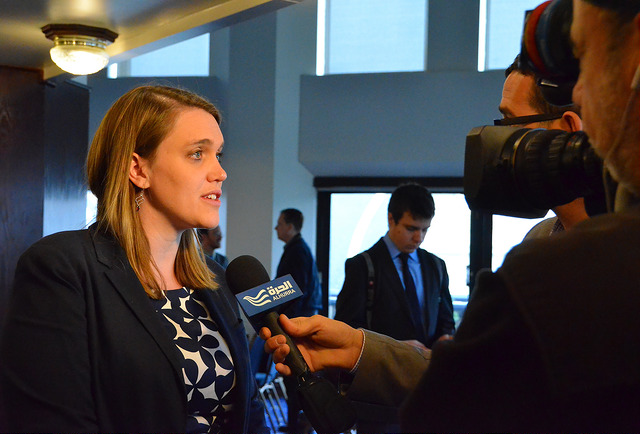"Though we have acheived progress, our work is not over. That is why I support the mission of the Arms Control Association. It is, quite simply, the most effective and important organization working in the field today."
Press Room
 The Arms Control Association works to keep the public and the press informed about breaking arms control developments. Below you will find our latest press releases and media advisories.
The Arms Control Association works to keep the public and the press informed about breaking arms control developments. Below you will find our latest press releases and media advisories.
Journalists and Producers: If you are interested in speaking with or scheduling an interview with one of our experts, please contact our communications team.
LATEST PRESS RELEASES
Experts at the Arms Control Association welcomed the call for President Obama to join Mine Ban Treaty made today by 15 past Nobel Peace Prize winners.
U.S. and European nuclear arms control and security experts criticized NATO's new "Strategic Concept" as a conservative, backward-looking policy, a missed opportunity to reduce the number and role of the 200 forward-deployed U.S. tactical nuclear bombs and engage Russia in a dialogue on removing all tactical nuclear weapons from Europe.
Daryl G. Kimball, executive director of the Arms Control Association, responded to today's statement by Sen. Jon Kyl (R-Ariz.) on New START with the following comments:
"Prompt ratification of New START is essential for U.S. national security. It is irresponsible for Senate Republican leaders to block a vote on this common sense treaty and ignore the advice of the U.S. military and Republican and Democratic national security experts," Kimball said.
Originally appeared in Dos Mundos, a bilingual newspaper in Kansas City, on October 13.
The Arms Control Association released a new study, Assessing Progress on Nuclear Nonproliferation and Disarmament: 2009-2010 Report Card, by its research staff that measures the performance of 11 key states in 10 universally-recognized nonproliferation, disarmament and nuclear security categories over the past 18 months. The study gives grades to China, France, Russia, the United Kingdom, the United States, India, Israel, Pakistan—each of which possess nuclear weapons—and North Korea—which maintains a nuclear weapons capability—as well as Iran and Syria, which are under investigation for possible nuclear weapons-related activity.
Ahead of an important Oct. 14 meeting of NATO defense and foreign ministers to discuss the alliance’s draft “Strategic Concept,” two nuclear arms control and security experts are calling for the alliance to initiate a comprehensive review of outdated NATO nuclear policy at their Lisbon summit in November. The aim of the effort, they argue, should be to reduce the role and salience of nuclear weapons and support reductions of U.S. and Russian tactical nuclear bombs.
Tuesday, the Senate Foreign Relations Committee approved by voice vote a resolution for advice and consent for ratification of Defense Trade Cooperation Treaties with Australia and the United Kingdom as well as legislation to implement them. Experts at the nonpartisan Arms Control Association (ACA) recommended today that the full Senate indefinitely defer consideration of these treaties.
Today the Senate Foreign Relations Committee approved the New Strategic Arms Reduction Treaty (New START) with strong bipartisan support, 14-4, opening the way for approval by the full Senate before it adjourns for the fall election, according to leading nuclear security and arms control experts.
According to a recent Carnegie Endowment for International Peace Proliferation Analysis by Daryl Kimball, President Obama should use the International Day against Nuclear Tests to reiterate his pledge to ratify the Comprehensive Test Ban Treaty.
The Senate Foreign Relations Committee announced today that it plans to hold a vote on the New Strategic Arms Reduction Treaty on September 15 or 16, which would open the way for a vote by the full Senate this fall.
As the world’s top conventional arms exporter with one of the most robust export control systems, the United States arguably stands to benefit more than any country from raising global arms trade standards.
As Arms Trade Treaty PrepCom Nears, Experts Analyze Arms Trade and Recommend Action in Arms Control Today
Experts from the Arms Control Association joined with leaders of 31 national organizations urging Secretary of State Hillary Rodham Clinton to take a bold approach in preparatory committee meetings on a legally binding arms trade treaty (ATT) set to begin next week.
Op-ed in The Press by Zia Mian and Daryl Kimball
In a letter sent this week to the 46-member states of the Nuclear Suppliers Group (NSG), a prestigious and broad array of more than 40 experts and nongovernmental organizations from 14 countries urged that these nations "reiterate to the Chinese government that it must not engage in nuclear trade with Pakistan in a way that violates nonproliferation obligations and norms."
Letter sent to Ambassadors attending the Nuclear Suppliers Group meeting in New Zealand, June 2010.
Statement by ACA Executive Director Daryl G. Kimball on the 2010 nuclear Nonproliferation Treaty (NPT) Review Conference and consensus final document.
In the latest ACA Threat Assessment Brief, "New START Verification: Up to the Challenge," Senior Fellow Greg Thielmann examines the treaty's extensive system to monitor compliance with the treaty's new and lower limits on deployed strategic warheads and delivery systems.
The Senate Foreign Relations Committee formally begins consideration today of the New Strategic Arms Reduction Treaty (New START) following its official submission to the Senate last week for advice and consent. President Obama has called for the treaty to be approved before the November elections; a busy Senate schedule makes the actual timing unclear.
U.S. and European nuclear arms control and security experts reacted to the elements of a report from a group of senior advisors on reform of NATO's basic mission statement describing recommendations on Alliance nuclear policy as a missed opportunity to look forward and take the chance to mold the future of the Alliance.
